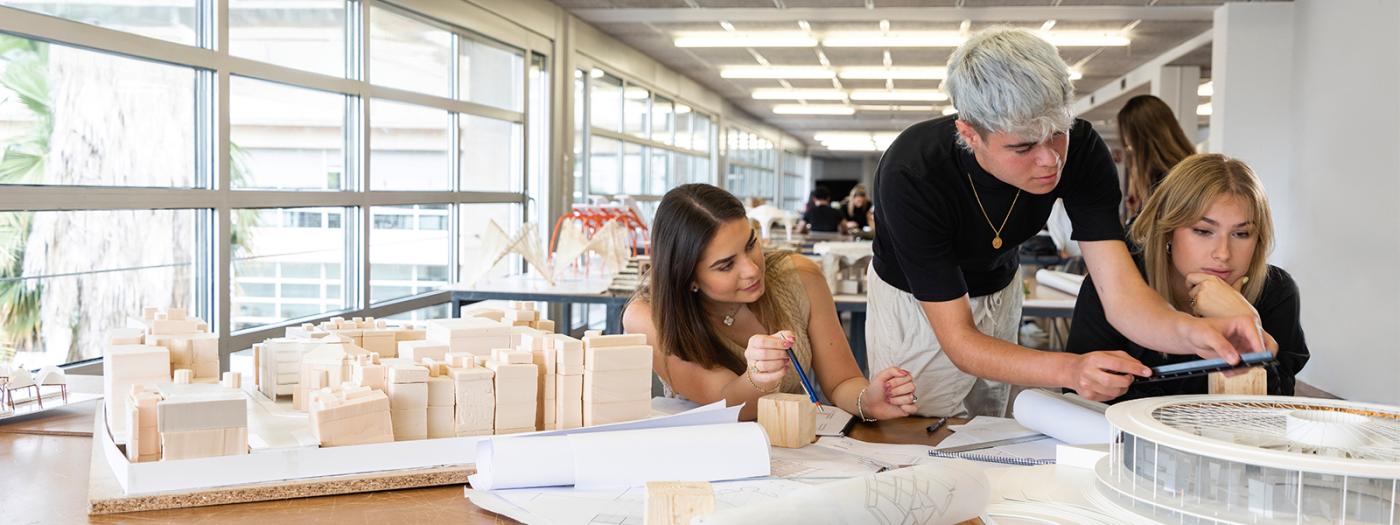It is advisable to have studied all the subjects of the subject in which you collaborate.
The student, through departmental collaboration, faces a field of work that makes him deepen in the subject to which he is assigned. You can go to the sources of knowledge, contrasting the relationship of what you have learned from the state of science, and the application of it in the real exercise of the profession.
Objectives included in the RD:
5. Ability to understand the relationships between people and buildings and between them and their surroundings, as well as the need to relate the buildings and spaces that are located between them, depending on the needs and the human scale.
6. Ability to understand the profession of architect and its role in society, in particular developing projects that take social factors into account.
7. Knowledge of the methods of research and preparation of construction projects.
10. Conception capacity to meet the requirements of the users of the building respecting the limits imposed by the budgetary factors and the regulations on construction.
11. Appropriate knowledge of industries, organizations, regulations and procedures to capture projects in buildings and to integrate the plans in the planning.
In the departmental collaboration, the student can develop aptitudes related to teaching, the procedures of follow-up of the learning, the search and the organization of the content of the subjects. Close collaboration with teachers who teach a subject helps to deepen into it, as well as in the way of teaching.
The departmental collaboration provides knowledge of work procedures in group, logistics, regulations, bibliography and documentation.
General competences:
Instrumental:
IS 2- Be able to organize and plan the application of new knowledge.
IS 3- To be able to acquire basic general knowledge about the area of ​​study.
IS 8- Be able to acquire information management skills (ability to search and analyze information from different sources).
IS 11- Be able to acquire basic and fundamental knowledge of the field of education.
IS 12- That they are able to acquire knowledge in some specialization of training.
Interpersonal:
IT 2- To be able to work as a team in the professional field.
IT 8- That they are able to acquire an ethical commitment (in the attitudes and expositions of the educational and professional activities).
Systemic:
CS 4- To be able to re-adapt to new situations.
CS 5- Let them be able to generate new ideas (creativity).
CS 8- Let them be able to work autonomously.
CS 6- Be able to acquire leadership skills (in team work and decision making).
CS 10- Be able to acquire initiative and entrepreneurial spirit.
CS 12- That they are able to achieve new challenges (in the capacity to incorporate new solutions and work methods).
Specific competences:
GROUP A: SKILLS
Fitness for:
A30- MANAGEMENT OF CONSTRUCTIVE STANDARDS. Aptitude or ability to apply the rules of construction, homologation, protection, maintenance, security and calculation in the integrated projects and in the execution, as much of works of edificación as of urban spaces.
GROUP B: SABERS
Suitable knowledge of:
B29- DEONTOLOGY AND CORPORATE ORGANIZATION. Understanding or knowledge of the ethical and organizational principles of the exercise of the architecture, including the structure and regulatory collegiate, the hiring of professional services, the modalities of association and legal personality and the conditions of civil responsibility.
B30- PROFESSIONAL PROPERTIES. Understanding or knowledge of the administrative procedures of the architectural activity, such as financing and contracting of works, preparation of unit files, presentation of documents and management of visas and licenses.
B32- WORK METHODOLOGY. Understanding or knowledge of the organization systems of the professional offices regarding the distribution of tasks and responsibilities, control of production time, labor costs and performances, economic administration and commercial planning.
B33- BUSINESS METHODOLOGY. Understanding or knowledge of the general methods of organization, management, administration, planning and business management and its application to the real estate and construction sectors.
The student learns practicing. The knowledge is acquired through the organization and exhibition of the contents. This model of learning based on doing is understood as a constructivist, while the student builds knowledge based on experience. It supposes 100% to the personal work, realized individually or in equipment.
The work that is assigned to him in the department will have to adapt to his level and to contribute challenges to which he can face.
Within the department, a tutor will be appointed to oversee and monitor the work of the student.
Dedication to the subject 3 ECTS credits at 26 hours / credit = 78 hours
Six-monthly dedication 15 weeks (13 practices + 2 coordination)
Weekly dedication 6 hours / week of internships
Concept Total hours
78 Hours work of the student (individual and in group)
78_Development of supervised project
0No tutored
Total hours spent outside the coordination 78
Unregistered coordination hours 0
Total semester dedication 78
The evaluation of the acquisition of competences will be carried out by the person responsible for supervising the student within the department:
This person will follow up and carry out a continuous evaluation of the student's collaboration. The final evaluation will be carried out by the coordinator or responsible for the subject or subject, if applicable.
The evaluation of the student's work is done based on the capacity to respond to the problems raised, based on the ability to define how to orientate the work and the development of the same. Personal involvement and attitude are valued.
The tutor will qualify the student with a score of 0 to 10.
